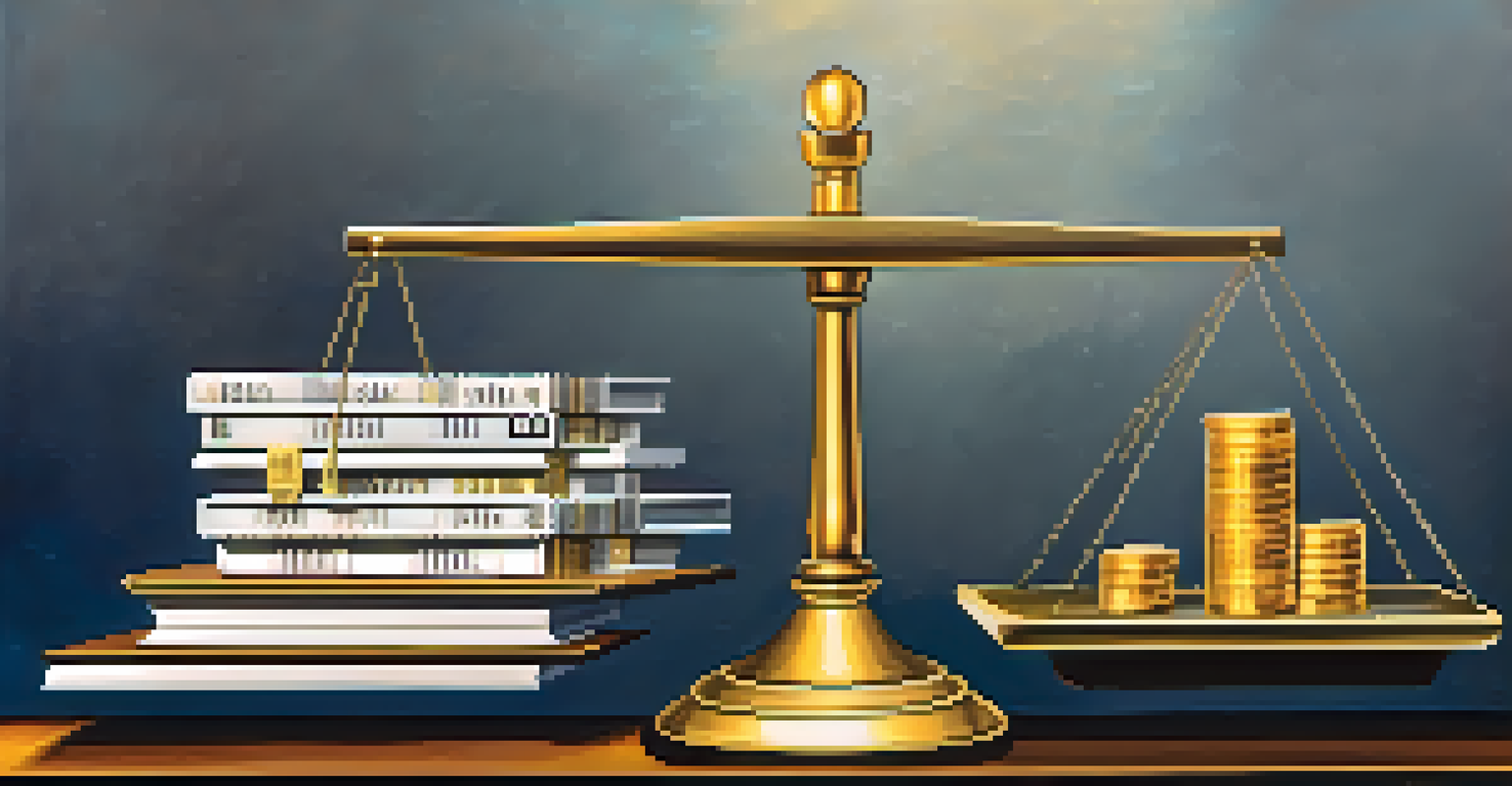Wealth Taxes: A Solution to Growing Economic Inequality?

Understanding Wealth Taxes and Their Purpose
Wealth taxes are levies imposed on the net worth of individuals, targeting the rich rather than income. The main goal is to redistribute wealth and curb the growing gap between the affluent and the less fortunate. By taxing assets such as properties, stocks, and other investments, wealth taxes aim to generate revenue that can be used for public services and welfare programs.
The problem of economic inequality is not just a moral issue; it is also a practical problem that affects the entire economy.
In essence, wealth taxes can be viewed as a way to ensure that those who possess significant wealth contribute fairly to society. This contribution can help fund education, healthcare, and infrastructure improvements, which benefit everyone. By leveling the playing field, proponents argue that wealth taxes can create a more equitable society.
However, critics often argue that wealth taxes may discourage investment and economic growth. They worry that taxing wealth could lead to individuals moving their assets to more tax-friendly locations. Balancing the need for equity with economic growth remains a key challenge in the wealth tax debate.
The Growing Economic Inequality Crisis
Economic inequality has been a pressing issue in many countries, with wealth increasingly concentrated in the hands of a few. According to recent reports, the richest 1% hold more wealth than the bottom 90% combined. This disparity can lead to social unrest and reduced economic mobility for those at the bottom of the income ladder.

The COVID-19 pandemic exacerbated these inequalities, with many lower-income individuals facing job losses while billionaires saw their fortunes soar. As the gap widens, there are rising calls for solutions that can address this imbalance effectively. Wealth taxes have emerged as a potential remedy, garnering attention from policymakers and the public alike.
Wealth Taxes Aim for Fairness
Wealth taxes are designed to redistribute wealth from the rich to fund public services and reduce economic inequality.
Addressing economic inequality is not just a matter of fairness; it also has implications for overall economic stability. When wealth is concentrated, it can lead to decreased consumer spending and lower demand for goods and services. Thus, finding ways to redistribute wealth could have positive effects on the economy as a whole.
Global Perspectives on Wealth Taxes
Various countries have implemented wealth taxes with varying degrees of success. For instance, countries like Norway and Spain have had wealth taxes in place for years, contributing to their social welfare systems. These nations often report lower levels of economic disparity compared to those without such taxes.
If we are to make progress in reducing inequality, we will need to create a system where the wealthy pay their fair share.
However, the effectiveness of wealth taxes can depend on how they are structured and enforced. In some cases, loopholes and exemptions have undermined their intended impact. This highlights the importance of creating comprehensive tax policies that minimize evasion and ensure that the wealthy pay their fair share.
In contrast, countries like the United States have been hesitant to adopt wealth taxes, primarily due to concerns about their potential economic impact. The ongoing debate continues as many nations observe the outcomes of wealth taxes abroad to inform their own policies.
Pros and Cons of Implementing Wealth Taxes
Advocates for wealth taxes argue that they can effectively reduce income inequality and provide essential funding for public services. By taxing the wealthy, societies can invest in education, healthcare, and infrastructure, ultimately benefiting all citizens. This perspective emphasizes the moral obligation of the wealthy to contribute to the common good.
On the flip side, critics express concerns that wealth taxes may lead to capital flight, where wealthy individuals move their assets to avoid taxation. This could result in reduced investment in the domestic economy, potentially stifling growth. Additionally, the administrative costs of implementing and enforcing wealth taxes can be significant.
Economic Inequality Is Growing
The concentration of wealth among the top 1% poses threats to social stability and economic mobility for the lower-income population.
Ultimately, the debate over wealth taxes revolves around finding the right balance. Policymakers must carefully consider both the potential benefits and drawbacks to create a system that promotes fairness without hindering economic growth.
Case Studies: Countries That Have Tried Wealth Taxes
Sweden is often cited as a successful example of wealth taxes, having implemented them in the 1990s. Initially, the tax contributed to a reduction in inequality, but over time, political shifts led to its repeal due to concerns about capital flight. This case illustrates the complexities of maintaining wealth taxes in a globalized economy.
In contrast, Switzerland has a more localized approach, with cantons (regions) having differing tax rates on wealth. This system allows for flexibility and competition among regions, helping to retain wealthy residents. However, it also raises questions about the fairness of varying tax burdens across the country.
These case studies highlight that the effectiveness of wealth taxes can vary significantly based on local context and implementation strategies. Understanding these real-world examples can provide valuable insights for countries considering similar measures.
The Role of Public Opinion in Wealth Tax Debates
Public opinion plays a crucial role in shaping policies surrounding wealth taxes. In many countries, there is a growing demand for greater economic equality, with citizens expressing support for taxing the wealthy. This shift in mindset is often driven by increasing awareness of economic disparities and their social consequences.
However, public sentiment can be influenced by political narratives and media portrayals of wealth taxes. Supporters argue that they are a fair way to address inequality, while opponents often frame them as punitive measures that could hinder economic growth. This dichotomy can complicate the policy-making process.
Global Views on Wealth Taxes Vary
Countries have adopted wealth taxes with mixed results, highlighting the need for effective implementation and public support.
Ultimately, for wealth taxes to gain traction, they must be framed in a way that resonates with the public's values. Engaging citizens in discussions about the benefits and potential consequences of wealth taxes can help foster a more informed debate, paving the way for meaningful reform.
Future Perspectives: Are Wealth Taxes Here to Stay?
As economic disparities continue to grow, the conversation around wealth taxes is likely to persist. Many experts predict that governments may increasingly turn to wealth taxes as a means to address budget deficits and fund social programs. This trend suggests that wealth taxes could become a staple in the tax systems of various countries.
However, the future of wealth taxes will depend on the political climate and public sentiment. If citizens perceive these taxes as beneficial for society, they may gain more acceptance. On the other hand, if opposition continues to mount, policymakers may be hesitant to implement them.

In conclusion, while the path forward for wealth taxes is uncertain, their potential to address economic inequality remains a critical point of discussion. As nations grapple with the challenges of wealth concentration, wealth taxes may emerge as a viable solution in the ongoing quest for economic equity.